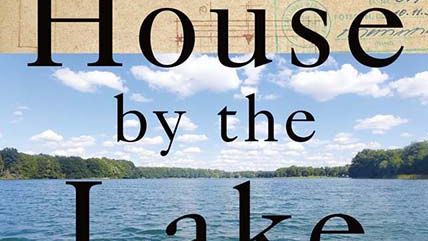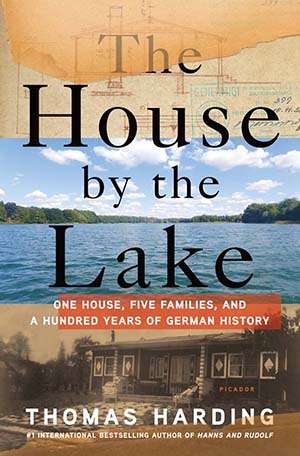If These Walls Could Sprechen
The story of a small German cottage built by Jews, seized by Nazis, gifted to a Stasi informant, and taken over by punk rockers

The House by the Lake: One House, Five Families, and a Hundred Years of German History, by Thomas Harding, Picador, 464 pages, $28

A few miles west of Berlin, a little house sits on Groß Glienicke lake, a quiet eye in the storm of Europe's worst century ever.
Nazi bureaucrats arrived at their Final Solution at nearby Wannsee. The Red Army poured through at the end of World War II. Churchill and Truman drove past on their way to meet Stalin in Potsdam. The Berlin Airlift rattled the cupboards as planes landed at and left Gatow airfield. Secret policemen lurked as the Berlin Wall rose. The house endured the long, twilight struggle of the Cold War, the fall of the Wall, and the reunification of Germany.
In 1927, during Germany's sunny Weimar interlude, Dr. Alfred Alexander, head of Berlin's Chamber of Physicians, commissioned a simple wooden cottage as a family retreat. When he tacked a mezuzah by the front door, it was a gesture to a faith worn lightly. Alexander and his family called themselves "three-days-a-year Jews": observant during high holidays, but thoroughly assimilated into Berlin's cosmopolitan upper middle class.
The Alexanders delighted in sun-drenched al fresco meals on the terrace. The children swam and rowed in clear, cool waters. Daughter Elsie was particularly fond of the peace and beauty of the lake house; she called it her "soul place."
But the rise of the Third Reich brought an end to those reveries. At university, Elsie had to display little yellow stars on her textbooks. Brownshirts demonstrated outside their city home. Whispered warnings circulated. Elsie and her sister pleaded with their father to leave Germany. He told Elsie, "I was a soldier and an officer in the war and I received the Iron Cross. Nothing will happen to me."
In the end, the Alexanders left for England, their valuables sewn into their coats, just before escape became impossible.
In 2013 one of their descendants travelled to Groß Glienicke to see the place his family had once treasured. British journalist Thomas Harding, Elsie's grandson, found an inauspicious hovel scheduled for demolition. "There was a sadness to the place," he writes, "the melancholy of a building abandoned."
He set about discovering the full, poignant history of his grandmother's soul place—the land, the house, and all who called it home. He uncovered remarkable stories, some forgotten to history, others deliberately concealed. And he shared them in his book, The House by the Lake.
Soon after the family's escape, the Gestapo seized their home and Alexander's medical practice. As Harding mentions in an endnote, the punctilious police reviewed the doctor's books and proceeded to collect on his accounts receivable. Panicked patients paid up, though some complained they shouldn't have to pay for services from a Jew.
The Reich sold the lake house at a deep discount to a cheerful, enterprising conformist named Will Meisel. A music publisher, he spent much of the war in Groß Glienicke, producing musical theater and benefitting from a pragmatic enlistment in the Nazi Party.
Flights of hundreds of Allied bombers heralded the coming end of the war. The Red Army swept through Groß Glienicke in the final days. Their victory celebrations came at the expense of a young mother at a neighboring house who, like hundreds of thousands of other German women, survived several rapes by Russian soldiers.
The war left no visible scars on Meisel or the house. After a lengthy denazification the producer was cleared to work, but he lost claim to the lake house as the Iron Curtain descended across Europe.
One great value of The House by the Lake is its wealth of fresh detail on life along the border of East and West during the long, gray decades of the Cold War. Harding gives overdue attention to a time often fast-forwarded through in our historical memory.
The line between East Germany and West Berlin cut through the back yard of the lake house, but the border was porous in the early postwar period. In Groß Glienicke, East and West German media intermingled on the airwaves and in town gossip. Residents lost friends and acquaintances in a series of grisly serial killings in the neighborhood. The mutilated corpses drew lurid wall-to-wall coverage in the West. Perhaps because suspicion focused on occupying Soviet troops, the East German media responded with a blend of denial and silence. The locals received an early education in the absurd juxtapositions between observable reality and official accounts.
While Western powers recruited or let slip individual Nazi spies and rocket scientists, the new socialist authorities in East Germany appropriated other elements of the Third Reich. The Hitler Youth transitioned smoothly to the red-kerchiefed Thälmann Pioneers. Surveillance and meticulous record-keeping persisted. Even some concentration camps were maintained with fresh shipments of political prisoners and new classes of undesirable people.
As the Soviet occupation calcified into a permanent puppet state, the Stasi—East Germany's notorious secret police—awarded residency at the lake house to Wolfgang Kühne, a newly recruited informant. Kühne's unearthed Stasi files provide surprising comic relief. His handlers were annoyed by his choice of code name, "Ignition Key," and exasperated by his laziness and tendency to let liquor eclipse his work for the Party. Somehow Kühne survived to become the longest-tenured resident of the house. He left his mark, removing large (sometimes drafty) windows overlooking the lake, sealing off the fireplace, and plastering wallpaper over Alexander's antique Delft tiles in the mantle. In Harding's words, the once-lovely cottage became "a botched product of East German utilitarianism."
In August 1961, Kühne awoke to furious construction on the lake shore. Soldiers and workers had begun to erect the "Anti-Fascist Protection Barrier"—or as we came to know it, the Berlin Wall. It began as a single barbed-wire fence, but it expanded over time. A tall concrete wall ran along the lake shore. The lake house's trees and sloping lawn were replaced by barbed wire, buried mines, tripwires, and a patrol road. Guard dogs served on rotations, lest they grow too friendly with the local human beings. An inner wall of concrete rose just 10 meters from the lake house's back door.
Now the lake was invisible from the lake house. The place's soul had been cut away.
Not-so-green East German environmental practices left the water contaminated with sewage and choked in algae, its shore lined by rusting tangles of wire and forgotten explosives. On land, Wolfgang's son Bernd and his friends played in a schoolyard close enough to the wall to make a game of tossing sticks into the death strip along the border. They tried to trigger green signal flares or, if they were lucky, to set off a more serious red flare that brought trucks full of alerted troops. Teachers would shout, "Don't throw sticks at our Anti-Fascist Protection Device!"
The teachers also asked their grade schoolers to describe the shape of the clock in the background of the news broadcasts their parents watched. "If they replied with 'rectangle,' then the teacher knew that their parents were watching Aktuelle Kamera on DDR at 7:30 p.m.," Harding writes. "But if they said the news had a circular clock, then the teacher would know that Tagesschau was being watched, an 8 p.m. news program carried by the Western channel ARD, and the child's family would be reported to the authorities."
When the Soviet Empire's slow decay became a rapid collapse, the people living in Moscow's shadow met its fall with anxiety. The absence of dictatorship does not necessarily lead to an embrace of freedom. The wary residents of Groß Glienicke elected a former border guard commander as their first post–Cold War mayor.
But the demolition of the wall reunited the lake house with its reason for being. After Kühne's death, a young stepson brought in roommates, pumped out punk and metal music, and presided over lakeside parties through the turn of the millennium.
Eventually the house came under municipal ownership as a prelude to potential redevelopment. It fell into disrepair. Only a red fox, her kits, and desperate drug addicts made use of the place until Harding rediscovered it as a haunted vacant building in 2013.
Thomas Harding's quest to recover and preserve past residents' lives led to an effort to save and restore the house itself. The property is now a historic site and an unlikely common ground for several German generations.
Josef Stalin supposedly quipped that one death might be a tragedy but a million deaths are a mere statistic. Harding's work stands in defiance of that heartless calculation. Against the No Life Matters ethos of the 20th century, The House by the Lake proves that history's lethally impersonal forces, mass displacement, arbitrary borders, marching armies, and totalitarian dictatorships cannot fully erase the private joys and sorrows of individual lives.
This article originally appeared in print under the headline "If These Walls Could Sprechen."

Show Comments (59)